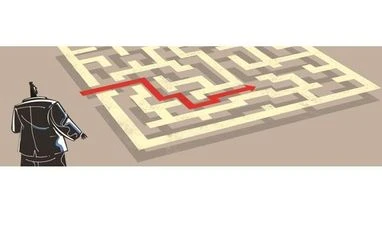It is increasingly looking as if the world economy is in for a major deflation because of coming debt defaults. The massive load of financial risk appears to be becoming unsustainable. Why?
To answer this question we first need to ask if anyone would hand over a machine gun to a monkey. Yet, globally, this is what has happened after John Maynard Keynes wrote the most influential economics book of the 20th century. It said governments must spend money to increase aggregate demand when it fell below a certain level.
He meant well, but he forgot that governments are run by politicians. The result after about 80 years is there for all to see.
The world is heading towards another massive letting out of air because politicians think they can spend their way out of every crisis that might cost them votes, regardless of the real reasons for the crisis.
Thus, even if the latest Chinese virus acts as the trigger, it is only the proximate cause for the coming deflation. If not this, it would have been something else.
The fundamental cause has been the political response to an economic problem. For example, as politicians have done, trying to compensate for low or negative productivity by handouts financed by taxpayers.
The biggest culprit is the USA because it prints as many dollars as it wants to. But the costs of doing this for it are not as great as they are for the rest. Since 1971, when it unilaterally went off the gold standard, it has pumped trillions of dollars into the world economy and has destroyed several economies.
That said, the problem is not that the dollar is the world’s reserve currency. Realistically speaking, it is the only one that can be.
The problem is that those who are in charge think they can print dollars ad infinitum. It’s the irresponsibility, not the fact of the dollar being the reserve currency, that’s the problem.
Bernie Sanders is a perfect example of this well-intentioned irresponsibility. Obama was another.
Keynes and the politicians
Before the Great Depression of 1929-36 the world grappled with the problem of igniting a revival differently. It simply waited.
But Keynes said no, if we wait, Communism will spread uncontrollably. So he provided his solution — print currency to finance budget deficits, which would be incurred to cure unemployment, which if left untreated, would lead to Red trouble.
This was a good economic solution to a political problem. But as with all good technical solutions to political problems, it’s gotten out of hand because these things can be overdone as they provide the easy way out. The monetary and fiscal excesses of politicians, which have led to what is called financialisation, have caught up with the world.
Financialisation, by the way, is a vague term to mean that an increasing proportion of world output is because money, instead of producing goods, is producing more money. The rude name for it is betting.
To give just example, a usually reliable estimate says there are $600 trillion worth of derivatives floating around. Netting may take care of maybe half of that but what about the rest? Well folks, stick your head between your legs and start praying.
Such flaky bets had led to the crisis of 2008. They are leading to another now because politicians responded to the 2008 crisis with a Keynes++ solution. The world has pumped in around $10 trillion between 2009 and now.
Back to pre-Keynes
So what should be done? Quite simply, we have to now discard the Keynesian solution. It has become like an addictive drug that causes hallucinations of well-being. The Congress since 1985 provides a perfect example of this.
But if not increased government spending, what will boost deficient aggregate demand? This is what economics has to grapple with. It must provide the intellectual justification for taking the G out of the Keynesian identity.
Whoever writes the mirror image book of Keynes’ General Theory must bear in mind, like Keynes had done, that pre-emptive action is needed. The alternative is a Japan-like 30-year slump.
Keynes persuaded the rich to pay more taxes to revive the economy. Now someone has to persuade the beneficiaries of that tax-and-spend prescription to accept that governments can no longer come to their rescue. The beneficiaries must pay too.
Keynes thought gold was a “barbaric relic”. But is it possible that he was wrong? Should not currencies have an anchor other than some IMF inspired fiscal deficit level of 3 per cent which is just an arbitrary number?
Keynes clothed his basic prescription in a lot of flimflam about various things which are no longer of anything but academic interest. Now his basic prescription is also only of academic interest.
Unlock 30+ premium stories daily hand-picked by our editors, across devices on browser and app.
Pick your 5 favourite companies, get a daily email with all news updates on them.
Full access to our intuitive epaper - clip, save, share articles from any device; newspaper archives from 2006.
Preferential invites to Business Standard events.
Curated newsletters on markets, personal finance, policy & politics, start-ups, technology, and more.
)